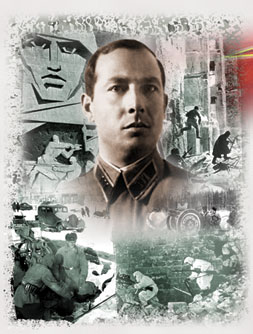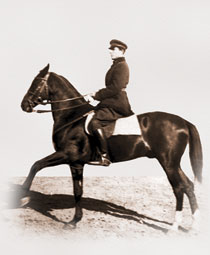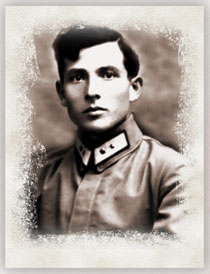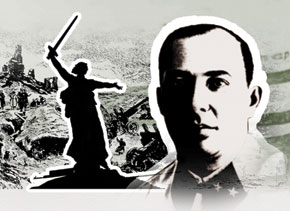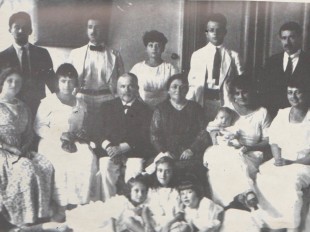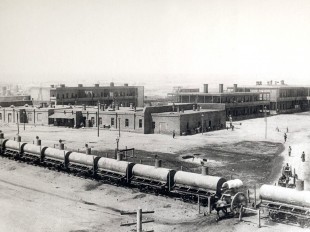Pages 54-58
By Shamistan Nazirli
Major General Yagub Allahgulu Guliyev, alongside the more celebrated Hazi Aslanov, was one of the Azerbaijani heroes of the great battle for Stalingrad during World War II.
Numerous articles, memoirs and books about the war, especially about Stalingrad, stated that cavalry general Yagub Guliyev was Turkmen. Moreover, the soldiers of the 4th cavalry corps, of which he was deputy commander, swore during his funeral ceremony that they would never let the ‘Turkmen star’ be dimmed:
Our dearest Yagub will shine, beam and live in our hearts forever. 25 years after the war Turkmen historian Roza Bazarova was first to write in her monograph about the general that he was Azerbaijani. Part of the monograph was published in the Edebiyyat ve Sungat newspaper on 25 January 1970 and Bazarova wrote:
He was born in the land of Azerbaijan – Shusha city. He was an ethnic Azerbaijani. His path in life was that of a true man, rising from private soldier to general.
Research has confirmed that the general was indeed Azerbaijani - a son of the Azerbaijan nation. It is gratifying to know that a Turkmen historian acknowledged this fact. In 1982 we met the general’s niece, Khadija Abbasova, who worked in a weaving company in Ganja; we learned certain facts about her uncle and were given some photographs.
Yagub Allahgulu Guliyev was born on 25 January 1900 in Shusha, Karabakh. Just a few years later, the Armenian-Muslim bloodshed began in the city. As writer Yusif Vezir Chemanzamanli (1887-1943) described in his memoirs:
The Dashnak party [Armenian Revolutionary Federation – ed.], taking advantage of the Russo-Japanese war and revolutionary disturbances, launched their terror: government officials were killed on the streets in broad daylight. Many others were also killed in Shusha.
….as the economic situation of Shusha was bad, most craftsmen and unemployed people were leaving the city for the villages and other cities. The highly educated population were attracted to Baku and, some, to Ashgabat.
Driven from Shusha
Yagub’s father Allahgulu took his family away from this disaster and moved to Turkmenistan, as did many other Karabakh families. At first they went to Merv, but it was difficult to make a living there and so Allahgulu followed the advice of his compatriots and moved to the settlement of Yoloten.
He purchased a piece of land to provide for his family; he cultivated it and life was much improved. Yagub’s sister Badisaba and brother Gulam were born in Yoloten. As the elder son of the family, Yagub helped his father to sell vegetables in the market. There was neither Azerbaijani nor Turkmen school in Yoloten, so Yagub was sent to the Russian school. At first it was difficult for him to study but the boy worked hard and was soon keeping pace with his classmates. He spent his leisure time playing war games with children on the bank of the Murghab River. As Yoloten was situated on the border, there were a lot of Russian border-guards there. Yagub made friends with them and improved his Russian.
Allahgulu became seriously ill with pneumonia in the summer of 1916. Believing that he was close to death, he summoned his children and instructed them: Do honest labour and take care of your mother. He was never to leave his bed again.
As their situation became worse, mother Zuleykha was forced to sell some of their belongings. Finally, Yagub could not accept this situation. He left school and began to work in the cotton gin plant, first in Yoloten and then in Mary, but he kept up his friendship with the border-guards. He would often go to the military unit and water and feed the guards’ horses.
One day Yagub returned home in a fret and said to brother Gulam:
Have you heard about the meeting in the city? The tsar has been overthrown. You take care of our mother; I am going with some friends to Merv for a few days…
He was away for some time and when he returned his mother Zuleykha was shocked to see a red ribbon in the cap on his head and a rifle in his hand. She hugged him joyfully and repeatedly kissed his cheeks
- Oh, I would give my life for you, Yagub! The uniform suits you very much. What does this mean, son?
- From now on, I am a soldier of the Red Guard, mother!
Everyone in the neighbourhood was jealous of this gentle young soldier.
That was the start of Yagub Guliyev’s military life.
The making of a soldier
A two-month military course for army recruits began in spring 1918 in Merv. Yagub had a strong interest in the military and was an excellent soldier, so he was sent to do the course. He trained well and studied the various armaments willingly. After the course he returned to his company and participated in battles against the White Guards. S.Skorobogatov, who served with him in those years, wrote later:
Guardsman Yagub fought with great courage against the class enemies; he was fearless. Once he was taken prisoner by the White Guards. He escaped from captivity and made his way first to Yoloten and from there to Bayram-Ali on foot. He had begun his struggle against the enemy as a platoon commander in the army. He also rescued a group of friends from captivity and took them with him.
In 1924 Yagub was dispatched to the Central Asia military school in Tashkent for training. He graduated with honours, remained there as a teacher and was promoted to the rank of squadron commander. Five years later, in 1929, the young officer was entrusted with a more important appointment. He was made chief of the military school for the Turkmenistan Cavalry Regiment.
As one reads the numerous reminiscences written about General Yagub Guliyev and his activities in Central Asia, as well as during the Great Patriotic War (1941-1945), it is impossible not to be amazed by his soldierly professionalism. This talented military leader, who lived only forty-two years, acquired great authority among his fellow soldiers and officers.
The cavalry squadron he commanded in the 1930s carried out successful operations against rebels and White Guards in Kizil-Arvat, in the expanse of the Karakum desert, the Ag-Zila steppe and in the territory of Girkh-Guyu.
In 1932 Yagub was made Chief of Staff of the 2nd Turkmenistan Cavalry Regiment. A year later he was sent to the Frunze Military Academy, thus becoming the first Central Asian commander to get a high military education.
His former classmate, Major General Mikhail Gryaznov reminisced:
Thirty years ago I was studying with Yagub Guliyev at the Military Academy. He was the sergeant major of our group. He studied well and was a skilful commander and General Pavel Kurochkin, leader of our training group, always held him up as an example to us. Everybody respected the sensitive, modest young commander. This officer, at first sight so calm, became fire and flame in competitions between the training groups. The squadron he led always took first place. Yagub helped to transform students without damaging their morale.
The foundation of our friendship was laid during that training at the academy, anytime we were in trouble, he always helped us. We finished the training in autumn 1936 and took part in the parade in Moscow. I remember we separated in November 1936. Yagub gave me his Caucasian sword: “Take it as a keepsake to remember” – he said, “But don’t forget that it was handmade in the native land of my ancestors, in the Caucasus.” I still have his sword at home. I had a lot of friends on military service; Yagub Guliyev has a special place among them. It is very difficult to lose such a friend. It is a thousand pities that he did not see victory and live to be old. He was killed when his talent was in full blossom; he was only forty two years old…
On the western front
In May 1941 Colonel Yagub Guliyev was appointed commander of the famous 21st Cavalry Division in Central Asia. On 14 June, the command came down from General Headquarters: the division was divided into echelons and dispatched to the front. The train left Central Asia behind and headed west. The fascists were bombing Bryansk and Orel in western Russia. As instructed by General Headquarters, Guliyev’s division was allocated to Front Headquarters Command. They were situated in a forest twenty kilometres from Suraj.
Reconnaissance brought the news that there were strong enemy tank and mechanized groups on the division’s route. Colonel Guliyev did not propose to meet the enemy face to face: the only way was to encircle small companies and annihilate them in surprise attacks.
Enemy planes were flying low overhead, trying to locate the division.
Colonel Alexander Kibalnikov, a comrade-in-arms, recalled:
Although we were hiding in the forest, enemy fighters often fired at our division. They were difficult moments. When a fighter plane attacked again, Yagub himself took up the heavy machine gun and returned fire. The planes following saw this and immediately turned back. Commander Yagub Guliyev’s bravery encouraged our cavalrymen. The enemy plane veered away, crashed into the forest and blew up. That was the first one we destroyed. Our division advanced towards Roslavl. On 2 August, at 3 o’clock in the morning, news came from the scouts: General Guderian’s 24th Tank Corps was moving along the Krichev-Roslavl highway. Within half an hour our division was facing the enemy. There was a tough battle. It was our first real fight. Even though our division took heavy losses, we were successful. Our division delayed the 24th Tank Corps’ rapid advance for more than 24 hours and destroyed some of the enemy’s tanks. In view of Colonel Yagub Guliyev’s fighting ability, experience and service, the Bryansk Front Council of War appointed him commander of the combined 21st, 52nd and 55th Cavalry Divisions. This combined cavalry group was established to undertake special military operations and later we fought for the cities of Yampol and Orel.
Guliyev’s 21st Mountain and Cavalry Division fought from the first months of the war in the forest and swamplands of Belarus and struck crushing blows against enemy troops.
Marshal of the Soviet Union Sergey Biryuzov, who witnessed these successful operations, later wrote extensively about the wartime activities and human qualities of General Yagub Guliyev, in his war memoirs When Guns Began to Fire. The Marshal wrote:
At that time the 21st Mountain and Cavalry Division was a recent arrival at the front, from the Central Asia Military Region. The division was commanded by the swarthy, dark-eyed, highly energetic and courageous colonel, Yagub Guliyev. As soon as Guliyev received his orders he said:
- ‘If we just get out of this swamp … We won’t need to fear anything.’
During this battle we made friends with the cavalrymen. It became clear that they were patriots and good comrades. This friendship was displayed not only in intervals between battles but also in moments at the height of battle. I still remember those courageous fighting men and their commander, Colonel Yagub Guliyev, with gratitude. At the end of January 1942, Colonel Guliyev was invited to Moscow and appointed deputy of the 4th Cavalry Corps. On 11 February of the same year he was promoted to major general by order of the Soviet of People´s Commissars of the USSR.
We should point out that he was the first man to be appointed major general during the Great Patriotic War.
The battle for Stalingrad
The situation at the front deteriorated. The fascist army invaders passed the Don Fields and sped towards Stalingrad. Yagub Guliyev was dispatched to that front.
On 19 November 1942, Lieutenant-General Timofei Shapkin and Major General Yagub Guliyev spent sleepless nights preparing to make a decisive attack by going behind the enemy and launching a surprise attack. The first attack was very successful. The cavalry crops liberated Abganerevo station, the city of Aksay and numerous settlements from the enemy. General Guliyev, always leading from the front, provided a personal example of courage and unequalled valour.
In those days the cavalry of our two brave compatriots within the 5th Strike Force were fighting side by side in the Kotelnikovo region: Hazi Aslanov’s tank regiment and the 4th Cavalry Corps, headed by deputy commander General Yagub Guliyev. Unfortunately Hazi did not survive the war, either. He fell heroically in the battle for Liepaja, Latvia, on 24 January 1945.
On 16 December Manstein’s wild troops were fighting stubbornly, supported by the Panzer tanks sent by Hitler. Their aim was to break the blockade around Field-Marshal Paulus’s troops. They had to be thwarted at all costs. This was the task set to the soldiers and officers of the 4th Cavalry Corps. They had to hold their position until the arrival of General R.Malinovsky’s 61st Caucasian Division. Yagub Guliyev again fought at the very forefront in these battles. Just before the decisive victory on the Stalingrad front, on 22 December 1942, this courageous general was fatally wounded by fascist gunfire. Yagub Guliyev, who gained honour as a son of Azerbaijan and a Turkmen Star, fell asleep forever by the Volga, having fallen during heavy fighting on the Lisky River near Stalingrad, on 22 December 1942.
Honoured in death
His bravery was highly appreciated by the government, even after death, and he was awarded the Order of Lenin.
We recall the sincere words of Marshal of the Soviet Union Sergey Biryuzov, who loved and respected the courageous sons of Azerbaijan. The marshal, who participated in the Stalingrad battles, had heart-warming thoughts about Hazi Aslanov too. He wrote about the heroism of General Yagub Guliyev and his fighting men:
Rebels of the 51st Army had been involved in ceaseless fighting for several days, even at nights. The condition of our right wing, the 5th Strike Force, was especially serious. The 14th Cavalry Corps included in this army had also suffered bad losses. They drew back to the East. Some cavalry corps commanders were killed. The deputy commander of the corps, General Yagub Guliyev, was fatally wounded. He was my comrade-in-arms on the Bryansk front. He won fame as a friendly man and attentive commander. I remember that when we were in Belarus he was desperate to go into action and fight as a cavalryman. In spite of the fact that the cavalry could not play such a great role as during the Civil war, thanks to such commanders as Yagub Guliyev they displayed unexampled valour in the struggle of the Soviet people against the Nazi occupiers. The name of the courageous and unforgettable General Yagub Guliyev was engraved on the granite plaque on the Mamay Mound in Stalingrad together with other participants.
The memory of General Yagub Guliyev has been immortalized in Turkmenistan. In April 1960 a bronze statue was erected to him in Mary city, a museum was devoted to him and a street named after him. Turkmen people love him as their own son, and refer to him as our star and Turkmen Star. Draftees take their solemn oath before the general’s statue. His name has become a symbol of courage for Turkmenistan.
The name of cavalry general Yagub Guliyev occupies an honoured niche in the military history of Turkmenistan and Azerbaijan.
About the author: Shamistan Nazirli is a known publicist and military historian. He is the author of monographs and books on military history and eminent military figures.
By Shamistan Nazirli
Major General Yagub Allahgulu Guliyev, alongside the more celebrated Hazi Aslanov, was one of the Azerbaijani heroes of the great battle for Stalingrad during World War II.
Numerous articles, memoirs and books about the war, especially about Stalingrad, stated that cavalry general Yagub Guliyev was Turkmen. Moreover, the soldiers of the 4th cavalry corps, of which he was deputy commander, swore during his funeral ceremony that they would never let the ‘Turkmen star’ be dimmed:
Our dearest Yagub will shine, beam and live in our hearts forever. 25 years after the war Turkmen historian Roza Bazarova was first to write in her monograph about the general that he was Azerbaijani. Part of the monograph was published in the Edebiyyat ve Sungat newspaper on 25 January 1970 and Bazarova wrote:
He was born in the land of Azerbaijan – Shusha city. He was an ethnic Azerbaijani. His path in life was that of a true man, rising from private soldier to general.
Research has confirmed that the general was indeed Azerbaijani - a son of the Azerbaijan nation. It is gratifying to know that a Turkmen historian acknowledged this fact. In 1982 we met the general’s niece, Khadija Abbasova, who worked in a weaving company in Ganja; we learned certain facts about her uncle and were given some photographs.
Yagub Allahgulu Guliyev was born on 25 January 1900 in Shusha, Karabakh. Just a few years later, the Armenian-Muslim bloodshed began in the city. As writer Yusif Vezir Chemanzamanli (1887-1943) described in his memoirs:
The Dashnak party [Armenian Revolutionary Federation – ed.], taking advantage of the Russo-Japanese war and revolutionary disturbances, launched their terror: government officials were killed on the streets in broad daylight. Many others were also killed in Shusha.
….as the economic situation of Shusha was bad, most craftsmen and unemployed people were leaving the city for the villages and other cities. The highly educated population were attracted to Baku and, some, to Ashgabat.
Driven from Shusha
Yagub’s father Allahgulu took his family away from this disaster and moved to Turkmenistan, as did many other Karabakh families. At first they went to Merv, but it was difficult to make a living there and so Allahgulu followed the advice of his compatriots and moved to the settlement of Yoloten.
He purchased a piece of land to provide for his family; he cultivated it and life was much improved. Yagub’s sister Badisaba and brother Gulam were born in Yoloten. As the elder son of the family, Yagub helped his father to sell vegetables in the market. There was neither Azerbaijani nor Turkmen school in Yoloten, so Yagub was sent to the Russian school. At first it was difficult for him to study but the boy worked hard and was soon keeping pace with his classmates. He spent his leisure time playing war games with children on the bank of the Murghab River. As Yoloten was situated on the border, there were a lot of Russian border-guards there. Yagub made friends with them and improved his Russian.
Allahgulu became seriously ill with pneumonia in the summer of 1916. Believing that he was close to death, he summoned his children and instructed them: Do honest labour and take care of your mother. He was never to leave his bed again.
As their situation became worse, mother Zuleykha was forced to sell some of their belongings. Finally, Yagub could not accept this situation. He left school and began to work in the cotton gin plant, first in Yoloten and then in Mary, but he kept up his friendship with the border-guards. He would often go to the military unit and water and feed the guards’ horses.
One day Yagub returned home in a fret and said to brother Gulam:
Have you heard about the meeting in the city? The tsar has been overthrown. You take care of our mother; I am going with some friends to Merv for a few days…
He was away for some time and when he returned his mother Zuleykha was shocked to see a red ribbon in the cap on his head and a rifle in his hand. She hugged him joyfully and repeatedly kissed his cheeks
- Oh, I would give my life for you, Yagub! The uniform suits you very much. What does this mean, son?
- From now on, I am a soldier of the Red Guard, mother!
Everyone in the neighbourhood was jealous of this gentle young soldier.
That was the start of Yagub Guliyev’s military life.
The making of a soldier
A two-month military course for army recruits began in spring 1918 in Merv. Yagub had a strong interest in the military and was an excellent soldier, so he was sent to do the course. He trained well and studied the various armaments willingly. After the course he returned to his company and participated in battles against the White Guards. S.Skorobogatov, who served with him in those years, wrote later:
Guardsman Yagub fought with great courage against the class enemies; he was fearless. Once he was taken prisoner by the White Guards. He escaped from captivity and made his way first to Yoloten and from there to Bayram-Ali on foot. He had begun his struggle against the enemy as a platoon commander in the army. He also rescued a group of friends from captivity and took them with him.
In 1924 Yagub was dispatched to the Central Asia military school in Tashkent for training. He graduated with honours, remained there as a teacher and was promoted to the rank of squadron commander. Five years later, in 1929, the young officer was entrusted with a more important appointment. He was made chief of the military school for the Turkmenistan Cavalry Regiment.
As one reads the numerous reminiscences written about General Yagub Guliyev and his activities in Central Asia, as well as during the Great Patriotic War (1941-1945), it is impossible not to be amazed by his soldierly professionalism. This talented military leader, who lived only forty-two years, acquired great authority among his fellow soldiers and officers.
The cavalry squadron he commanded in the 1930s carried out successful operations against rebels and White Guards in Kizil-Arvat, in the expanse of the Karakum desert, the Ag-Zila steppe and in the territory of Girkh-Guyu.
In 1932 Yagub was made Chief of Staff of the 2nd Turkmenistan Cavalry Regiment. A year later he was sent to the Frunze Military Academy, thus becoming the first Central Asian commander to get a high military education.
His former classmate, Major General Mikhail Gryaznov reminisced:
Thirty years ago I was studying with Yagub Guliyev at the Military Academy. He was the sergeant major of our group. He studied well and was a skilful commander and General Pavel Kurochkin, leader of our training group, always held him up as an example to us. Everybody respected the sensitive, modest young commander. This officer, at first sight so calm, became fire and flame in competitions between the training groups. The squadron he led always took first place. Yagub helped to transform students without damaging their morale.
The foundation of our friendship was laid during that training at the academy, anytime we were in trouble, he always helped us. We finished the training in autumn 1936 and took part in the parade in Moscow. I remember we separated in November 1936. Yagub gave me his Caucasian sword: “Take it as a keepsake to remember” – he said, “But don’t forget that it was handmade in the native land of my ancestors, in the Caucasus.” I still have his sword at home. I had a lot of friends on military service; Yagub Guliyev has a special place among them. It is very difficult to lose such a friend. It is a thousand pities that he did not see victory and live to be old. He was killed when his talent was in full blossom; he was only forty two years old…
On the western front
In May 1941 Colonel Yagub Guliyev was appointed commander of the famous 21st Cavalry Division in Central Asia. On 14 June, the command came down from General Headquarters: the division was divided into echelons and dispatched to the front. The train left Central Asia behind and headed west. The fascists were bombing Bryansk and Orel in western Russia. As instructed by General Headquarters, Guliyev’s division was allocated to Front Headquarters Command. They were situated in a forest twenty kilometres from Suraj.
Reconnaissance brought the news that there were strong enemy tank and mechanized groups on the division’s route. Colonel Guliyev did not propose to meet the enemy face to face: the only way was to encircle small companies and annihilate them in surprise attacks.
Enemy planes were flying low overhead, trying to locate the division.
Colonel Alexander Kibalnikov, a comrade-in-arms, recalled:
Although we were hiding in the forest, enemy fighters often fired at our division. They were difficult moments. When a fighter plane attacked again, Yagub himself took up the heavy machine gun and returned fire. The planes following saw this and immediately turned back. Commander Yagub Guliyev’s bravery encouraged our cavalrymen. The enemy plane veered away, crashed into the forest and blew up. That was the first one we destroyed. Our division advanced towards Roslavl. On 2 August, at 3 o’clock in the morning, news came from the scouts: General Guderian’s 24th Tank Corps was moving along the Krichev-Roslavl highway. Within half an hour our division was facing the enemy. There was a tough battle. It was our first real fight. Even though our division took heavy losses, we were successful. Our division delayed the 24th Tank Corps’ rapid advance for more than 24 hours and destroyed some of the enemy’s tanks. In view of Colonel Yagub Guliyev’s fighting ability, experience and service, the Bryansk Front Council of War appointed him commander of the combined 21st, 52nd and 55th Cavalry Divisions. This combined cavalry group was established to undertake special military operations and later we fought for the cities of Yampol and Orel.
Guliyev’s 21st Mountain and Cavalry Division fought from the first months of the war in the forest and swamplands of Belarus and struck crushing blows against enemy troops.
Marshal of the Soviet Union Sergey Biryuzov, who witnessed these successful operations, later wrote extensively about the wartime activities and human qualities of General Yagub Guliyev, in his war memoirs When Guns Began to Fire. The Marshal wrote:
At that time the 21st Mountain and Cavalry Division was a recent arrival at the front, from the Central Asia Military Region. The division was commanded by the swarthy, dark-eyed, highly energetic and courageous colonel, Yagub Guliyev. As soon as Guliyev received his orders he said:
- ‘If we just get out of this swamp … We won’t need to fear anything.’
During this battle we made friends with the cavalrymen. It became clear that they were patriots and good comrades. This friendship was displayed not only in intervals between battles but also in moments at the height of battle. I still remember those courageous fighting men and their commander, Colonel Yagub Guliyev, with gratitude. At the end of January 1942, Colonel Guliyev was invited to Moscow and appointed deputy of the 4th Cavalry Corps. On 11 February of the same year he was promoted to major general by order of the Soviet of People´s Commissars of the USSR.
We should point out that he was the first man to be appointed major general during the Great Patriotic War.
The battle for Stalingrad
The situation at the front deteriorated. The fascist army invaders passed the Don Fields and sped towards Stalingrad. Yagub Guliyev was dispatched to that front.
On 19 November 1942, Lieutenant-General Timofei Shapkin and Major General Yagub Guliyev spent sleepless nights preparing to make a decisive attack by going behind the enemy and launching a surprise attack. The first attack was very successful. The cavalry crops liberated Abganerevo station, the city of Aksay and numerous settlements from the enemy. General Guliyev, always leading from the front, provided a personal example of courage and unequalled valour.
In those days the cavalry of our two brave compatriots within the 5th Strike Force were fighting side by side in the Kotelnikovo region: Hazi Aslanov’s tank regiment and the 4th Cavalry Corps, headed by deputy commander General Yagub Guliyev. Unfortunately Hazi did not survive the war, either. He fell heroically in the battle for Liepaja, Latvia, on 24 January 1945.
On 16 December Manstein’s wild troops were fighting stubbornly, supported by the Panzer tanks sent by Hitler. Their aim was to break the blockade around Field-Marshal Paulus’s troops. They had to be thwarted at all costs. This was the task set to the soldiers and officers of the 4th Cavalry Corps. They had to hold their position until the arrival of General R.Malinovsky’s 61st Caucasian Division. Yagub Guliyev again fought at the very forefront in these battles. Just before the decisive victory on the Stalingrad front, on 22 December 1942, this courageous general was fatally wounded by fascist gunfire. Yagub Guliyev, who gained honour as a son of Azerbaijan and a Turkmen Star, fell asleep forever by the Volga, having fallen during heavy fighting on the Lisky River near Stalingrad, on 22 December 1942.
Honoured in death
His bravery was highly appreciated by the government, even after death, and he was awarded the Order of Lenin.
We recall the sincere words of Marshal of the Soviet Union Sergey Biryuzov, who loved and respected the courageous sons of Azerbaijan. The marshal, who participated in the Stalingrad battles, had heart-warming thoughts about Hazi Aslanov too. He wrote about the heroism of General Yagub Guliyev and his fighting men:
Rebels of the 51st Army had been involved in ceaseless fighting for several days, even at nights. The condition of our right wing, the 5th Strike Force, was especially serious. The 14th Cavalry Corps included in this army had also suffered bad losses. They drew back to the East. Some cavalry corps commanders were killed. The deputy commander of the corps, General Yagub Guliyev, was fatally wounded. He was my comrade-in-arms on the Bryansk front. He won fame as a friendly man and attentive commander. I remember that when we were in Belarus he was desperate to go into action and fight as a cavalryman. In spite of the fact that the cavalry could not play such a great role as during the Civil war, thanks to such commanders as Yagub Guliyev they displayed unexampled valour in the struggle of the Soviet people against the Nazi occupiers. The name of the courageous and unforgettable General Yagub Guliyev was engraved on the granite plaque on the Mamay Mound in Stalingrad together with other participants.
The memory of General Yagub Guliyev has been immortalized in Turkmenistan. In April 1960 a bronze statue was erected to him in Mary city, a museum was devoted to him and a street named after him. Turkmen people love him as their own son, and refer to him as our star and Turkmen Star. Draftees take their solemn oath before the general’s statue. His name has become a symbol of courage for Turkmenistan.
The name of cavalry general Yagub Guliyev occupies an honoured niche in the military history of Turkmenistan and Azerbaijan.
About the author: Shamistan Nazirli is a known publicist and military historian. He is the author of monographs and books on military history and eminent military figures.
